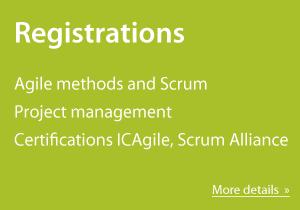

ICP-ACC - ICAgile Certified Professional in Agile Coaching - training in Prague on 23-24 September 2026
Date: 23-24 September 2026
Duration: 2 days
Early bird price: 24 000 CZK plus VAT (21%) valid until 30 days before the start of the training
Regular price: 29 000 CZK plus VAT (21%) otherwise
Place: Prague, Czech Republic
Language: English
Training is delivered by John Barratt accredited ICAgile trainer.
read moreDAO - Certified – Designing Agile Organizations - training in Prague on 17-18 September 2025
Date: 17-18 September 2025
Duration: 2 days
Early bird price: 1 095 EUR plus VAT (21%) valid until 30 days before the start of the training
Regular price: 1 295 EUR plus VAT (21%) otherwise
Place: Prague, Czech Republic
Language: English
Training is delivered by Jurgen De Smet accredited LeSS (Large Scale Scrum) trainer.
read moreJoin our Advanced ScrumMaster and Advanced Product Owner training in April 2025
Join me on confirmed A-CSM Advanced Certified ScrumMaster and A-CSPO Advanced Certified Scrum Product Owner training on April 22-23, 2025 and April 24-25, 2025 respectively in English.
Training will be delivere online (Zoom)
Register here. Looking forward.
read moreAgile communication: Back and forth between managers and teams
Everybody agrees these days that communication is one of the key success factors in any project, regardless of their size and complexity. During the agile adoption process, many teams and managers are blind to communication issues and believe everything is working just fine. However, experience suggests that communication is failing at many levels -managers don't really understand their developers, testers and other geeks, who on the other hand often fail to effectively sell their point back to management. Similar situations exist between sales and technical experts or even between developers and testers. The fact is that speaking the same language doesn't guarantee the understanding of each other's points.
You would most likely agree the communication is even more important than it used to be. As the business is changing faster, it expect from you to be flexible and adapt to the new conditions fast. There is no time anymore to write an exact specification, read it by analytics, write a design, read it by developers, and so on. Maybe some processes like that you had before you switched to Agile. And now, when you implemented one of the team oriented method like Scrum, XP, or Kanban, you are slowly discovering that the team members have to talk to each other on every day basis, they have to talk to customer, or even sometimes sell agile to their managers. Day by day you are learning how to talk to each other, how to facilitate discussions so the team agrees and make decisions fast, and people don't feel offended or pushed aside. Sprint after Sprint you are finding out how the communication is important and how powerful it is.
So how the communication is really working? What's the point?
We live in a world of communication conspiracy. Everywhere you look there are people who call for "communication improvements", "enhancing the communication" or "communication skills trainings". But maybe the real life is not so difficult. We are born with a certain pre-wired hardware with its limits. Our human brain, the greatest "tool" in a world, has its limits and liabilities. Have you ever think about the successful commercials and how they works? Why do you buy one product instead another one? Now imagine how the same principle applies to hearing of the information. Our brain comes equipped with series of sound filters and we add couple more during our life. Later we learn, we can ignore certain, long-lasting sounds, we can ignore the buzz at the party, but even in the rush, whenever someone says our name, we immediately react and hear it, right? And to add to this, people can be easily deceived; our attention can be dragged away from those important points if you understand the typical communication patterns.
From our childhood, we come equipped with many communication and behavioral patterns that were very useful in some situations, but can be non-productive or even dangerous in other circumstances. These patterns are like games, games that we automatically play during our lives. It's like flying on an autopilot without realizing, how close we are to the point, where the communication framework breaks down. It's extremely important to realize these games and the games other people play to improve the communication. It is not so difficult how it may look like from all the common communication trainings and understanding those patterns will help you in your daily lives immediately. You can instantly see the improvement, you can start right now.
Aside from understanding those patterns and recognizing the games people play, you need to be good in observing people around you. You do it intuitive when you talk to someone anyway, but now focus on the person you are going to talk. What could be possibly his point of view? Which parts are important to him? Which are crucial and why? Imagine these four persons are your managers and you are going to sell agile to them. Will you use the same strategy? Will you use the same wording? Of course not. You don't even have to think about that. You are using again those communication patterns you had learn when you were little and which you are improving as the life goes.
So you already know every person is different, and that the communication must adjust. As agile is based on heavy communication, it's useful to understand the communication patterns and games and don't be just on the passive side of those games, be real actor, choose your role. Decide if you like to play or rather prefer to select different strategy. Don't be just pushed by automatic reactions. In every situation it's completely on you, you are choosing your attitude; it's just about your head.
If you are interested in more details about this subject, come to one of my (and Eduard Kunce) talk or communication workshop.


